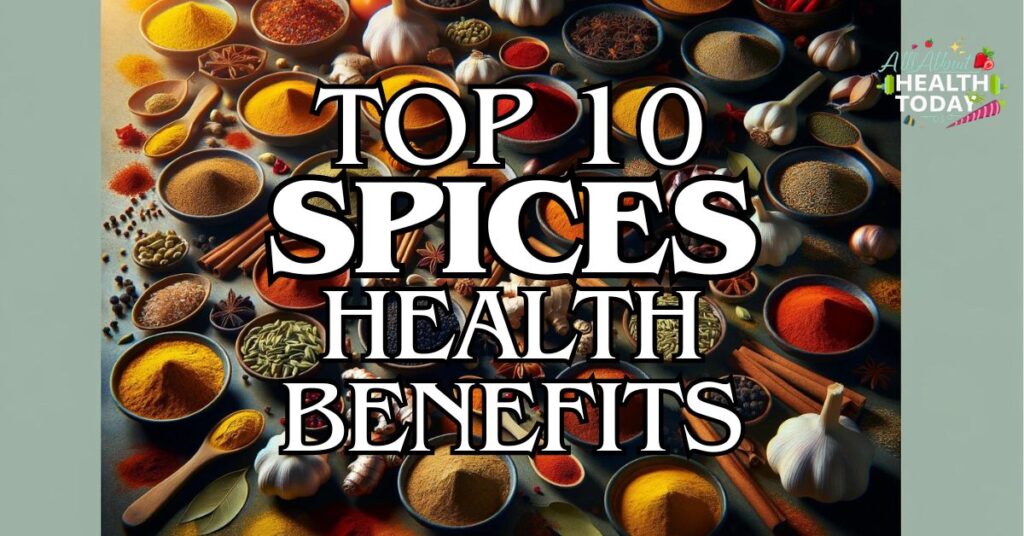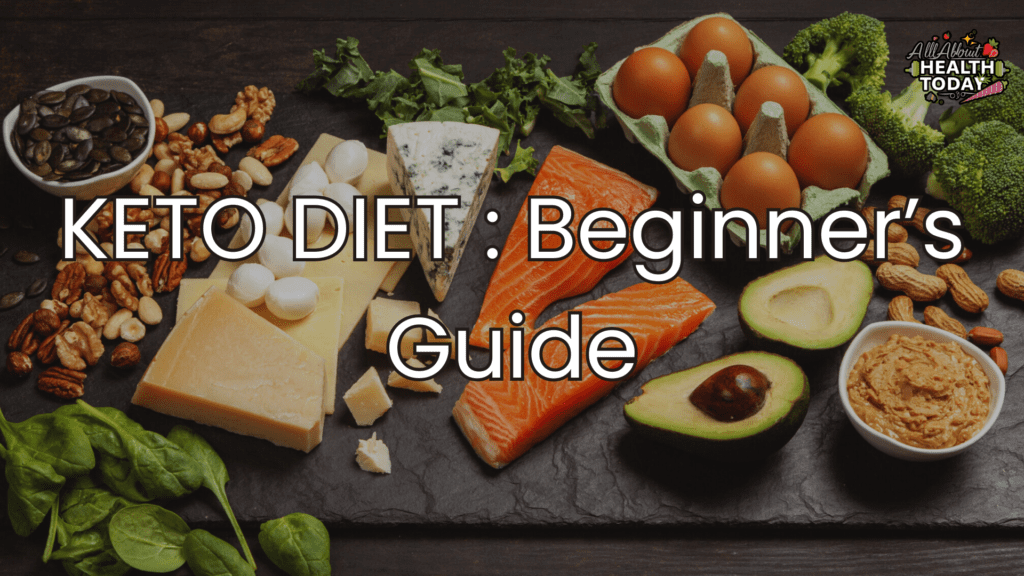Table of Contents
Introduction: A Spice Odyssey: Unlocking Nature’s Pharmacy
Imagine opening your kitchen cabinet and finding not just cooking ingredients, but a treasure trove of natural remedies, each with the power to transform your health. This is not a fantasy; it’s the reality of the incredible spices that have been sitting on our shelves, often overlooked in their daily culinary roles. From the vibrant turmeric that paints our curries gold to the humble black pepper that seasons our meals, these spices harbor secrets to longevity, vitality, and wellness that civilizations have cherished for millennia.
In our quest for modern health solutions, we often bypass the natural pharmacy that nature has stocked for us. The truth is, the key to unlocking some of the most profound health benefits doesn’t come from a lab; it comes from the soil, sun, and the careful nurture of the earth. This blog post embarks on an odyssey through the ancient world of spices, uncovering not just their culinary uses but their extraordinary health benefits that seem almost insane in their potency.
As we dive into the “Top 10 Spices with Insane Health Benefits,” we’re not just listing ingredients; we’re revealing allies in your journey to wellness. You’ll discover how these spices can fight inflammation, protect your heart, boost your metabolism, and even ward off chronic diseases. More than that, you’ll learn how to harness their power in your daily life, turning each meal into an opportunity for health and healing.
So, let’s embark on this spice odyssey together. Prepare to be amazed, inspired, and, most importantly, empowered. Because within your spice rack lies not just the flavors of the world but the secrets to a healthier, vibrant life. Let’s unlock nature’s pharmacy together.
1. Turmeric: The Golden Healer
Beyond Curry: A world of benefits
Long celebrated in the tapestry of Indian culture and cuisine, turmeric doesn’t just add a vibrant golden hue to dishes; it imbues them with a treasure trove of health benefits, making it a cornerstone of natural medicine. At the heart of turmeric’s power is curcumin, a compound that has been the subject of thousands of studies, revealing its potent anti-inflammatory and antioxidant properties.
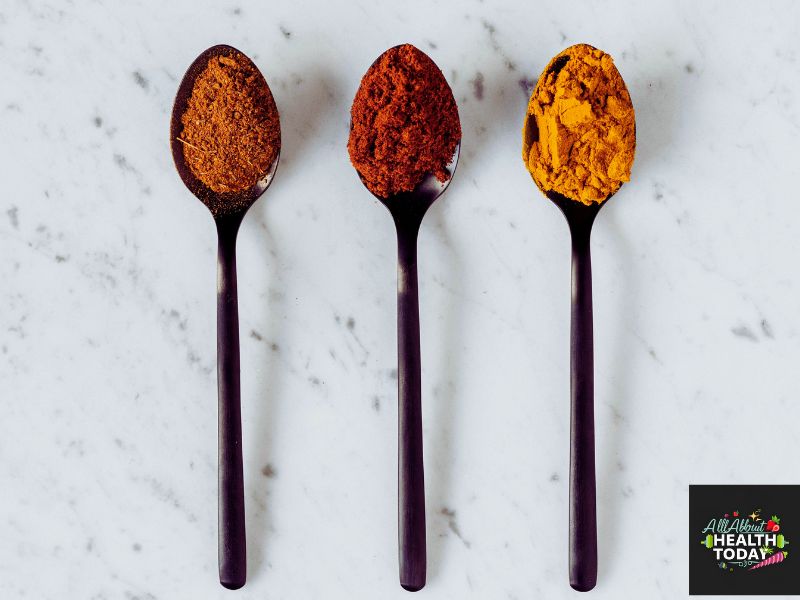
A Closer Look at Turmeric’s Benefits:
- Fights Inflammation: Curcumin is so effective at combating inflammation that it matches the effectiveness of some anti-inflammatory drugs, without the side effects.
- Boosts Brain Health: Turmeric can increase brain levels of Brain-Derived Neurotrophic Factor (BDNF), a type of growth hormone that functions in your brain, which may be effective at delaying or even reversing many brain diseases and age-related decreases in brain function.
- Lowers Risk of Heart Disease: Its antioxidant properties help improve the function of the endothelium, the lining of your blood vessels, which is essential for heart health.
- Prevents (and possibly helps treat) Cancer: Curcumin leads to several changes on the molecular level that may help prevent and perhaps even treat cancer.
Incorporating Turmeric into Your Life:
Adding turmeric to your diet is simple. You can start with a pinch of turmeric in your morning smoothie, sprinkle it over roasted vegetables, or brew a warm, soothing turmeric tea. For those looking to get a more concentrated form of curcumin, turmeric supplements are available, but it’s always wise to consult with a healthcare professional before starting any new supplement regimen.
Remember, though, turmeric’s curcumin is poorly absorbed into the bloodstream, so it’s beneficial to consume black pepper with it, which contains piperine, enhancing curcumin absorption by 2,000%.
As we continue to rediscover the wisdom of ancient spices, turmeric stands out not just as a culinary staple but as a beacon of health, offering a holistic approach to preventing disease and promoting wellness. Who knew that the secret to unlocking profound health benefits could be hiding in plain sight, within the golden depths of turmeric?
2.Cinnamon: Sweet Spice of Life
Not Just for Desserts: Blood sugar and beyond
Cinnamon, with its unmistakable warm aroma and sweet flavor, is beloved around the globe, not just for its culinary versatility but also for its remarkable health benefits. This spice, derived from the inner bark of trees belonging to the genus Cinnamomum, has been used medicinally for thousands of years. It’s packed with powerful antioxidants, such as polyphenols, which can help protect the body from oxidative damage caused by free radicals.

A Closer Look at Cinnamon’s Benefits:
- Regulates Blood Sugar Levels: Perhaps the most well-known health benefit of cinnamon is its ability to lower blood sugar levels. Studies have shown that cinnamon can improve insulin sensitivity and reduce fasting blood sugar levels, making it a supportive dietary addition for those managing diabetes. For example, a study published in the Diabetes Care journal found that cinnamon can significantly lower fasting blood glucose among patients with type 2 diabetes or prediabetes.
- Antioxidant Protection: The abundance of antioxidants in cinnamon places it high on the list of spices with health-protective properties. These antioxidants have anti-inflammatory effects, which can help lower the risk of disease. A comparative study highlighted cinnamon’s antioxidant activity, ranking it higher than garlic and oregano.
- Reduces Heart Disease Risk: Incorporating cinnamon into your diet can also benefit heart health. Research indicates that cinnamon can reduce levels of total cholesterol, LDL (bad) cholesterol, and triglycerides, while HDL (good) cholesterol remains stable or increases. A review of controlled studies suggests cinnamon intake of as little as 120 milligrams per day can have these effects .
Incorporating Cinnamon into Your Life:
The versatility of cinnamon makes it easy to incorporate into your diet. You can sprinkle cinnamon on your oatmeal, add it to your coffee, or blend it into smoothies. For a therapeutic dosage, cinnamon supplements are available, but moderation is key, as excessive consumption can lead to complications, especially for those with liver issues.
It’s important to choose Ceylon cinnamon over Cassia cinnamon if consuming it regularly in large amounts, due to the lower coumarin content in Ceylon cinnamon, which is safer for long-term use.
Cinnamon’s journey from a simple kitchen spice to a powerhouse of health benefits showcases the incredible potential of natural remedies. Its ability to support blood sugar regulation, protect against oxidative stress, and promote heart health exemplifies the profound impact that everyday spices can have on our well-being.
3.Ginger: The Root of Wellness
From Digestion to Immunity: A Versatile Ally
Ginger, with its distinct spicy flavor and aroma, has been revered as a culinary and medicinal herb across many cultures for centuries. This root, scientifically known as Zingiber officinale, is packed with bioactive compounds and nutrients that have powerful benefits for your body and brain.

A Closer Look at Ginger’s Benefits:
- Combats Nausea and Digestive Issues: Ginger is perhaps best known for its ability to combat nausea. It’s an effective remedy for morning sickness during pregnancy, motion sickness, and even nausea related to chemotherapy. Studies, including one published in the Journal of Ethnopharmacology, have shown ginger to be effective in reducing symptoms of nausea and vomiting in pregnant women without significant side effects.
- Anti-Inflammatory and Pain Reduction: Ginger contains gingerol, a substance with potent anti-inflammatory and antioxidant effects. Research indicates that ginger can significantly reduce muscle pain and soreness caused by exercise. A study in the Journal of Pain found that consuming 2 grams of ginger per day, for 11 days, significantly reduced muscle pain in people performing elbow exercises.
- Lowers Cholesterol Levels: High levels of LDL lipoproteins (the “bad” cholesterol) are linked to an increased risk of heart disease. A 45-day study involving 85 individuals with high cholesterol concluded that 3 grams of ginger powder per day caused significant reductions in most cholesterol markers. This research suggests ginger can support heart health by improving cholesterol levels.
- Supports Immune Function: Ginger’s antioxidant properties can support your immune system. Regular intake of ginger may enhance your body’s ability to fight infections, from the common cold to inflammatory illnesses.
Incorporating Ginger into Your Life:
Incorporating ginger into your diet is both easy and delicious. You can add fresh ginger to your smoothies, teas, or dishes for an extra kick of flavor and health benefits. Ginger supplements are also available for those looking for a more concentrated form, but as with any supplement, it’s wise to consult a healthcare provider first.
Whether used in traditional ginger tea, savored in sweets, or included in savory dishes, ginger offers a unique combination of flavor and health benefits that can enhance your wellness routine.
4. Garlic: Nature’s Antibiotic
A Clove a Day: The heart health powerhouse
Garlic, a staple ingredient in cuisines worldwide, is not just renowned for its unique flavor but also for its impressive array of health benefits. This potent herb, belonging to the Allium family (which also includes onions and leeks), has been used since ancient times for both its culinary and medicinal properties.
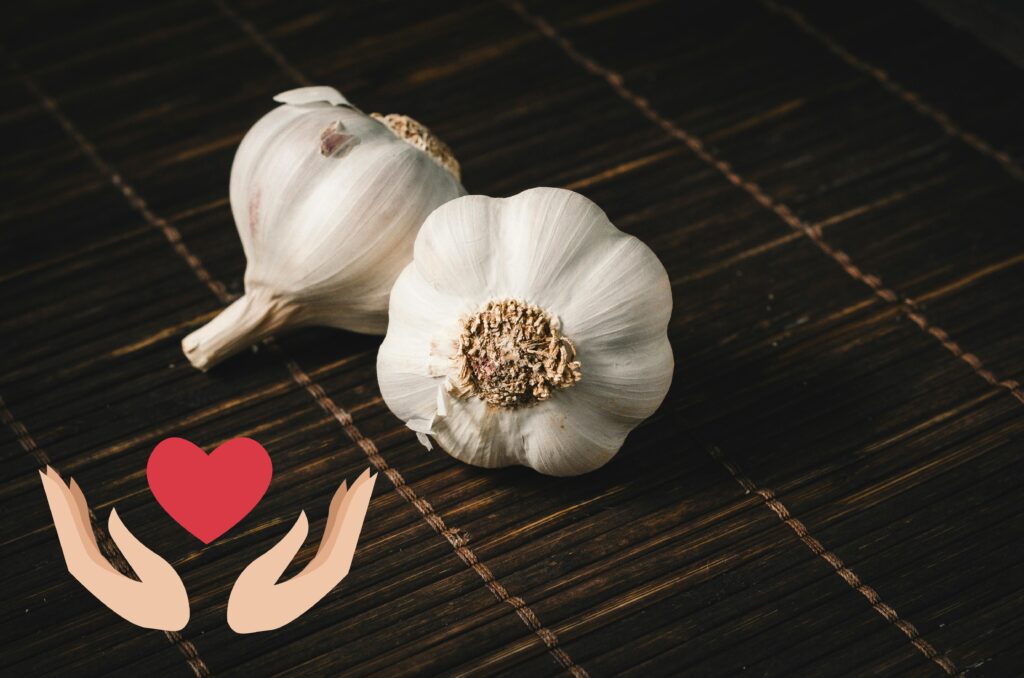
A Closer Look at Garlic’s Benefits:
- Boosts Immune System: Garlic is widely recognized for its immune-boosting effects. Its high concentration of compounds containing sulfur, such as allicin, contributes to its ability to fight off colds and infections. Studies have shown that regular consumption of garlic can reduce the incidence of colds, and even help shorten the duration of cold symptoms.
- Improves Cardiovascular Health: Garlic has significant cardiovascular benefits, primarily due to its ability to lower blood pressure and cholesterol levels. It acts on the circulatory system, enhancing the health of the heart and reducing the risk of heart disease. Garlic’s anti-inflammatory properties also play a crucial role in preventing arterial plaque buildup, a key factor in cardiovascular health.
- Natural Detoxifier: The sulphur-containing compounds in garlic not only give it its distinctive smell but also serve to detoxify the body. Garlic has been shown to enhance the elimination of toxins and heavy metals from the body, supporting liver function and promoting overall health.
- Supports Antioxidant Defense: Garlic’s antioxidant properties help combat oxidative stress, reducing the risk of chronic diseases such as Alzheimer’s and dementia. Its ability to enhance antioxidant defenses in the body contributes to longevity and better health.
Incorporating Garlic into Your Life:
Integrating garlic into your diet is both easy and beneficial. It can be added to almost any savory dish for an extra layer of flavor. For those looking to maximize its health benefits, consuming garlic raw or lightly cooked can preserve its active compounds. You might also consider aged garlic supplements, which provide concentrated doses of its beneficial properties without a strong odor.
Embracing garlic in your daily diet not only enriches your culinary experiences but also fortifies your body’s defenses, making it a truly indispensable ingredient in the kitchen and in your health regimen.
Continuing our journey through the spice cabinet, garlic exemplifies the power of natural ingredients to support our health and well-being, proving that sometimes the most potent medicine comes not from the pharmacy, but from the garden.
5.Cayenne Pepper: The Fiery Protector
Heat with Purpose: Boost metabolism and reduce pain
Cayenne pepper, derived from dried chili peppers, adds more than just a kick to your meals; it brings a host of health benefits, thanks to its active component, capsaicin. This compound not only gives cayenne its characteristic heat but also acts as a powerful catalyst for improving health and vitality.

A Closer Look at Cayenne Pepper’s Benefits:
- Metabolism Booster: Cayenne pepper is famed for its ability to enhance metabolic rate, thereby aiding in weight loss. Capsaicin has thermogenic properties, meaning it can increase the amount of heat your body produces, making you burn more calories per day. It’s a popular ingredient in many diet and weight loss supplements for this very reason.
- Pain Reliever: Beyond its metabolic benefits, capsaicin is a natural pain reliever. It works by reducing the amount of substance P, a chemical that carries pain messages to the brain. This makes cayenne pepper a useful remedy for managing conditions like arthritis and neuropathic pain.
- Improves Digestive Health: Cayenne pepper stimulates the digestive tract, increasing the flow of enzyme production and gastric juices. This aids in the body’s ability to metabolize food and toxins. Additionally, cayenne pepper has been shown to help relieve intestinal gas. It may also help improve intestinal health by reducing the risk of stomach ulcers.
- Supports Cardiovascular Health: The capsaicin in cayenne pepper helps to lower blood pressure and improve blood circulation. It also fights the buildup of cholesterol in the blood vessels, reducing the risk of heart disease. The anti-inflammatory properties of cayenne pepper further support heart health by reducing inflammation throughout the body.
Incorporating Cayenne Pepper into Your Life:
Adding cayenne pepper to your diet can be as simple as sprinkling a little into your favorite dishes for an extra layer of flavor and heat. For those looking to harness its health benefits more directly, cayenne pepper is also available in capsule form as a dietary supplement.
Whether used to spice up your cooking or as a natural remedy for various health concerns, cayenne pepper exemplifies the incredible power of spices to not only enhance the taste of our food but also to offer significant health benefits. Its ability to stimulate the metabolism, alleviate pain, support digestive health, and improve cardiovascular function makes it a valuable addition to a healthy lifestyle.
6. Cardamom: The Aromatic Guardian
Exotic and Potent: A breath freshener that does more
Cardamom, often referred to as the “queen of spices,” is not only treasured for its sweet, aromatic flavor but also for its impressive health benefits. Originating from the Indian subcontinent, this spice has gained worldwide popularity, not just for its use in cooking but also as a powerful natural remedy.
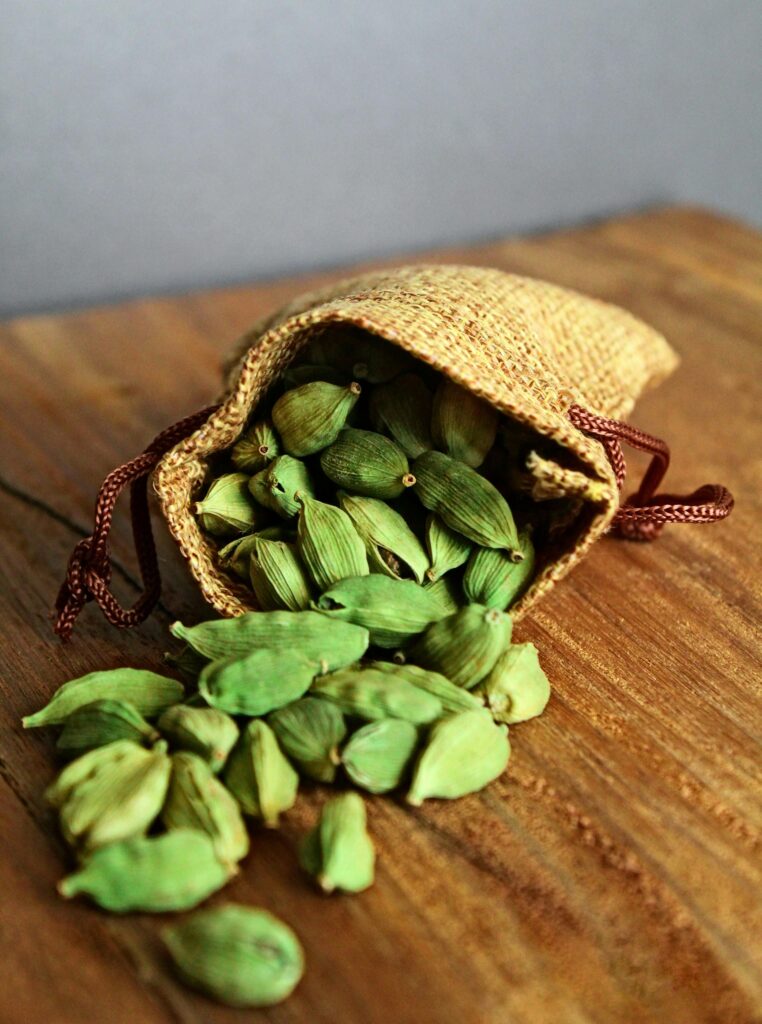
A Closer Look at Cardamom’s Benefits:
- Digestive Health: Cardamom is excellent for the digestive system. It helps in managing conditions like indigestion, gas, and constipation. Its carminative properties can reduce the formation of gas in the gastrointestinal tract, thereby alleviating bloating and stomach discomfort.
- Detoxification: Cardamom also acts as a natural detoxifying agent. It is believed to help in the removal of toxins from the body, especially the kidneys. The spice contains compounds that can help in the process of eliminating waste through the kidneys, ensuring that your body is cleansed of toxins.
- Oral Health: One of the traditional uses of cardamom is in oral health. Its strong aroma and antimicrobial properties can help in fighting bad breath and preventing oral infections. Chewing on a pod of cardamom can freshen your breath instantly.
- Antioxidant and Anti-Inflammatory: Cardamom is rich in compounds that have antioxidant and anti-inflammatory effects. These properties help protect cells from damage and reduce inflammation in the body, which is beneficial in preventing chronic diseases.
Incorporating Cardamom into Your Life:
Incorporating cardamom into your daily routine can be simple and enjoyable. You can add cardamom pods or powder to your tea or coffee for a unique flavor twist. Cardamom can also be included in baking and cooking for both its flavor and health benefits. For those looking to take advantage of its health properties more directly, cardamom supplements are available in health food stores.
Cardamom’s unique blend of sweet, spicy, and aromatic qualities, combined with its health benefits, make it a spice that goes beyond culinary uses. It supports digestive health, acts as a detoxifier, promotes oral health, and provides antioxidant and anti-inflammatory benefits, making it a valuable addition to a healthy lifestyle.
7. Clove: The Ancient Remedy
Small but Mighty: Antioxidants and Oral Health
Clove, derived from the flower buds of the clove tree, possesses a unique combination of sweet and spicy flavors that have made it a popular addition to various cuisines around the world. However, the benefits of clove extend far beyond its culinary uses; it’s also celebrated for its medicinal properties, which include powerful antioxidant, anti-inflammatory, and antibacterial effects.
A Closer Look at Clove’s Benefits:
- Oral Health: Clove has been traditionally used for dental care. Its main compound, eugenol, has antiseptic properties that are effective in combating oral bacteria and treating toothache. Gargling with clove water can help in reducing gum inflammation and alleviating tooth pain.
- Antioxidant Powerhouse: Clove ranks as one of the highest among spices in antioxidant content. Antioxidants help in protecting the body against oxidative stress and free radicals, which can lead to chronic diseases and aging.
- Anti-inflammatory Properties: The eugenol in clove also has anti-inflammatory properties. It can help reduce inflammation and pain, making clove a natural remedy for conditions like arthritis.
- Immune System Booster: The compounds found in clove have been shown to boost the immune system by increasing white blood cell count, thus enhancing the body’s ability to fight off infections.
Incorporating Clove into Your Life:
Adding clove to your diet is simple and can have significant health benefits. It can be incorporated into baked goods, teas, and savory dishes to add a warm, spicy flavor. Clove oil, diluted in a carrier oil, can be applied topically to alleviate toothache and muscle pain. However, due to its potent nature, clove oil should be used sparingly and with caution.
Cloves can also be used in a powdered form or as a whole bud to make a soothing tea. This not only helps in digestion but can also provide a calming effect, reducing stress and promoting a sense of well-being.
8. Fennel Seeds: The Gentle Healer
An Anise of Relief: Digestive Health and more
Fennel seeds, derived from the flowering plant Foeniculum vulgare, are not only valued for their distinctive sweet flavor but also for their powerful medicinal properties. These tiny seeds are packed with nutrients and have been used in traditional medicine for centuries to treat a wide range of ailments.
A Closer Look at Fennel Seeds’ Benefits:
- Digestive Health: Fennel seeds are perhaps best known for their positive effect on the digestive system. They can help relax the muscles in the gastrointestinal tract, reducing gas, bloating, and stomach cramps. This makes fennel seeds a go-to remedy for indigestion and IBS symptoms.
- Antioxidant Properties: Like many spices, fennel seeds are rich in antioxidants, which help combat oxidative stress and can protect against chronic diseases. They contain compounds like flavonoids and phenolic acids that contribute to their antioxidant activity.
- Anti-inflammatory Effects: The anti-inflammatory properties of fennel seeds can help reduce inflammation throughout the body, offering relief from conditions such as arthritis and heart disease.
- Supports Heart Health: Fennel seeds can have a beneficial effect on heart health by lowering blood pressure and reducing cholesterol levels. This is partly due to their high content of fiber and potassium, which are known to support cardiovascular health.
Incorporating Fennel Seeds into Your Life:
Incorporating fennel seeds into your diet is straightforward and delicious. They can be chewed raw after meals as a natural breath freshener and digestive aid. Fennel seeds can also be brewed into a calming tea, ideal for settling the stomach and relaxing the mind before bedtime.
For culinary uses, fennel seeds add a wonderful anise flavor to meats, soups, breads, and desserts. Their versatility in cooking is matched by their therapeutic benefits, making them a must-have in the pantry for both chefs and health enthusiasts alike.
9. Black Pepper: The King of Spices
More than Seasoning: Enhances nutrient absorption
Black pepper, derived from the dried fruit of the Piper nigrum plant, has been valued for its pungent flavor and preservative qualities for thousands of years. However, the health benefits of black pepper extend far beyond its culinary uses, thanks to its active compound, piperine, which has been shown to enhance nutrient absorption, improve digestive health, and exhibit antioxidant properties.
A Closer Look at Black Pepper’s Benefits:
- Enhances Nutrient Absorption: Perhaps one of the most significant benefits of black pepper is its ability to enhance the absorption of essential nutrients like selenium, calcium, and curcumin, the latter being the active ingredient in turmeric. Piperine increases the bioavailability of these compounds, making the nutrients more accessible to the body.
- Digestive Health: Black pepper stimulates hydrochloric acid secretion in the stomach, which aids in the digestion of proteins and other food components. This can help prevent indigestion and promote overall digestive health.
- Antioxidant Properties: Black pepper is rich in antioxidants, which help protect cells from oxidative stress and reduce the risk of chronic diseases such as heart disease and cancer.
- Anti-inflammatory Effects: The piperine in black pepper has been shown to have anti-inflammatory properties, which can help reduce inflammation in the body and alleviate conditions such as arthritis.
Incorporating Black Pepper into Your Life:
Incorporating black pepper into your diet is as easy as it gets. A sprinkle of freshly ground black pepper can enhance the flavor of nearly any dish, from salads and soups to pastas and meats. The key is to use it freshly ground, as this preserves its essential oils and active compounds, including piperine.
For those looking to maximize the health benefits of black pepper, consider pairing it with turmeric. The combination of turmeric and black pepper has been shown to significantly increase the absorption of curcumin, amplifying its anti-inflammatory and antioxidant benefits.
10. Saffron: The Pricey Spice
A Pinch of Gold: Mood, memory, and beyond
Saffron, harvested from the stigmas of the Crocus sativus flower, is renowned for its distinctive golden hue and rich aroma. This luxurious spice has been used for thousands of years in cooking, dyeing, and in traditional medicine across various cultures. Beyond its culinary uses, saffron is prized for its health benefits, particularly in improving mood and cognitive function.
A Closer Look at Saffron’s Benefits:
- Mood Enhancement: Saffron is perhaps best known for its potential to positively affect mood. Research suggests that saffron may help improve symptoms of depression and anxiety. The mood-enhancing properties of saffron are attributed to its antioxidant content and its ability to influence neurotransmitters such as serotonin.
- Supports Cognitive Function: Saffron has been studied for its potential to improve memory and cognitive function. This is particularly beneficial in age-related cognitive decline and conditions such as Alzheimer’s disease. The antioxidants in saffron, including crocin and crocetin, are believed to be responsible for these cognitive benefits.
- Eye Health: Saffron is also known for its vision-protecting properties. It has been shown to improve eye health and may slow down the progression of age-related macular degeneration, thanks to its high concentration of antioxidants.
- Heart Health: The spice may contribute to cardiovascular health by reducing blood pressure and preventing the formation of cholesterol plaques in the arteries. Its anti-inflammatory and antioxidative properties support the health of the heart and vascular system.
Incorporating Saffron into Your Life:
Adding saffron to your diet can bring a touch of luxury and health benefits. It can be infused in warm water to create a comforting tea, added to rice dishes for color and flavor, or used in baking and desserts for an exotic twist. Given its potency, a small amount of saffron is usually sufficient to reap its benefits.
Due to its high cost, it’s important to purchase saffron from reputable sources to ensure its quality and authenticity. While saffron supplements are available, incorporating the spice into your cooking is a delightful way to enjoy its health benefits.
How to Incorporate These Spices into Your Diet
Tips and Tricks for Everyday Wellness
Stop guessing and start progressing! Our Food Journal is your roadmap to dietary success, validated by nutritionists and loved by health enthusiasts. Get yours here!
Embracing the health benefits of spices means more than occasional use; it’s about integrating them into your daily routine in a way that’s both enjoyable and beneficial. Here are some practical tips to help you do just that:
- Start with Small Changes: Begin by adding a dash of cinnamon to your morning oatmeal or mixing turmeric into your smoothie. Small additions can lead to big changes in your health over time.
- Experiment with Flavors: Don’t be afraid to experiment with different spice combinations. The diverse flavors of these spices can transform even the simplest dishes into culinary masterpieces.
- Use Fresh Spices: Whenever possible, opt for fresh spices or freshly ground spices. They not only provide better flavor but also retain more of their health benefits compared to their pre-ground counterparts.
- Pair Wisely for Enhanced Absorption: Some spices work better together, not just in terms of flavor but also for health benefits. For example, combining black pepper with turmeric can significantly increase the absorption of curcumin.
- Explore Global Cuisines: Many international dishes inherently include a variety of spices. Exploring recipes from different cultures can be a delicious way to introduce more spices into your diet.
- Think Beyond Savory Dishes: Spices aren’t just for savory dishes. Incorporate them into your baking, smoothies, and even teas. For instance, cardamom and cinnamon can add a warming flavor to baked goods and beverages.
- Keep It Balanced: While spices offer immense health benefits, they are most effective as part of a balanced diet. Incorporate a wide variety of foods to ensure you’re getting a broad spectrum of nutrients.
Conclusion: The Spice Route to Health: Embracing Natural Solutions
Our journey through the world of spices reminds us that nature offers some of the most powerful tools for enhancing our health. Each spice, with its unique properties, contributes to a mosaic of flavors and benefits that can support our well-being in numerous ways. From improving digestion and boosting immunity to enhancing mood and supporting heart health, the spices we’ve explored offer a natural and delicious path to a healthier life.
Incorporating these spices into our daily routines is a simple yet effective way to enrich our diet with health-promoting properties. However, our journey towards optimal health doesn’t stop here. For those interested in further natural ways to support heart health, consider exploring our blog post on “The Best Vitamins for Heart Health.” This guide will introduce you to essential vitamins and how they can complement the benefits of spices to ensure your heart stays strong and healthy.
As we conclude this exploration, let’s remember that the key to harnessing the full potential of these spices—and indeed, all natural remedies—lies in consistent and mindful incorporation into our diets. Embrace the spice route to health, making every meal an opportunity to nourish your body and delight your senses. Here’s to a healthier, spicier life, with a heart that beats strong thanks to the natural bounty of spices and vitamins!
